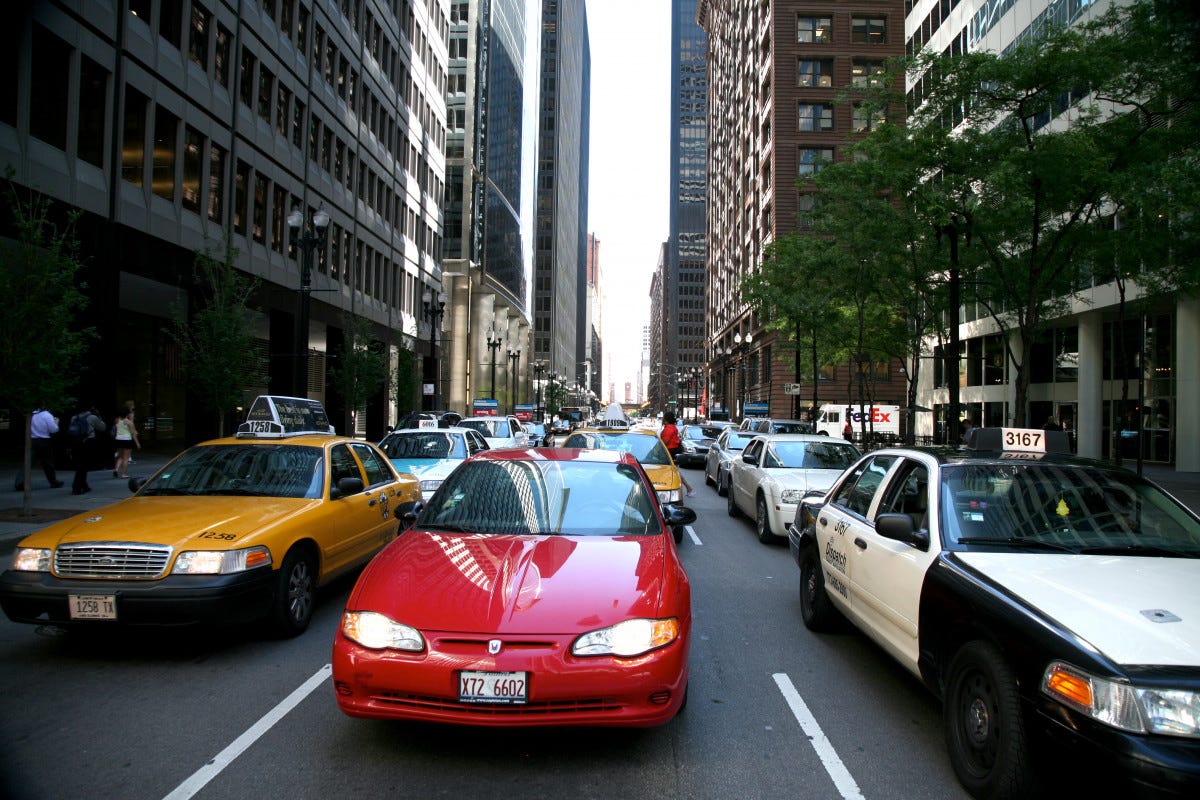Chicago needs a charter
Chicago stands on the precipice of change, and its newly inaugurated mayor has the opportunity to shape its future by advocating for a modern city charter.
Chicago is a city known for its vibrant culture and resilient spirit. This generation of Chicagoans has come to a critical juncture in the history of this great city. As the newly elected mayor, Brandon Johnson has the opportunity to lead the charge in establishing a modern city charter that will set the stage for a more transparent, accountable, and effective local government for generations to come.
In a real sense, the city has no charter at all. Chicago's current “special” city charter was established in 1837 and no longer adequately addresses the challenges and complexities of this 21st century metroplex. The world has changed dramatically since the end of the 19th century, and it is crucial that our governing framework evolves to reflect the realities of today. A modern city charter would provide a clear and comprehensive blueprint for how the city operates, ensuring that power is distributed effectively and that the rights and needs of all residents are protected.
A modern city charter would establish robust mechanisms for accountability and transparency, creating a stronger foundation for good governance. It would clearly delineate the roles and responsibilities of elected officials, prevent conflicts of interest, and promote ethical conduct. By fostering a culture of transparency, Chicagoans can regain trust in their government and actively participate in the democratic process. Additionally, a modern charter could include provisions for public access to government information and data, ensuring greater openness and accountability.
With a modern city charter, the governance structure can be streamlined to ensure more efficient decision-making processes. Outdated practices and bureaucratic inefficiencies can be addressed, empowering city officials to respond swiftly to the needs of the community. By simplifying procedures and eliminating unnecessary layers of bureaucracy, Mayor Johnson can promote a more agile and responsive government. This can lead to quicker resolution of issues and the ability to adapt to the rapidly changing dynamics of the city.
A modern city charter would grant Chicago greater local autonomy, allowing the city to address its unique challenges and capitalize on its opportunities. Through home rule powers, Chicago can make decisions that are best suited to its specific needs without unnecessary interference from state authorities. This increased flexibility empowers local leaders to implement innovative solutions and shape the city's future in a way that aligns with the aspirations of its residents. Mayor Johnson can utilize this autonomy to tackle longstanding issues such as education, infrastructure and economic development.
Do you have ideas for future Civic Update stories or want to contribute a story yourself? Email our editor by clicking the button below!
A modern city charter would foster collaborative decision-making processes by engaging various stakeholders, including community organizations, businesses, and residents. By involving a diverse range of voices in shaping policies and initiatives, Chicago can harness the collective wisdom and experience of its people. This inclusive approach ensures that decisions are well-informed, equitable, and reflect the aspirations and values of the entire community. Mayor Johnson can establish mechanisms for ongoing community engagement, town hall meetings, and advisory boards to ensure that decisions are made with the input and involvement of the people they affect.
An updated city charter would provide a solid foundation for fostering economic growth and attracting investment. By establishing clear rules and regulations, Chicago can create a business-friendly environment that encourages entrepreneurship and job creation. A modern city charter would also facilitate the implementation of strategic economic development plans, ensuring that Chicago remains competitive in a rapidly changing global landscape. Mayor Johnson can leverage this opportunity to attract new industries, support small businesses, and revitalize neighborhoods.
Mayor Brandon Johnson embodies the spirit of change and progress that Chicago needs to overcome its longstanding inability to work with state leaders to establish a city charter. Over the years, Chicago has witnessed several failed attempts to establish a new city charter. In the early 20th century, the Civic Federation led a movement to secure a new municipal charter, but it faced opposition from various groups, including middle-class progressive reformers and ethnic organizations. Efforts in 1909 and 1914-15 also did not bear fruit, and subsequent attempts to find charter relief through a new state constitution were met with disappointment due to the ongoing hostility between Chicago and the state legislature. But I believe that Mayor Johnson's first term represents a fresh moment for our city.
Throughout his career, Mayor Johnson has been a vocal advocate for marginalized communities, fighting tirelessly for policies that address systemic inequities. He understands that a modern city charter is not just a bureaucratic reform, but a powerful tool for advancing social and economic justice in Chicago. As a catalyst for change, Mayor Johnson can use his position to rally support from various stakeholders, including community organizations, advocacy groups, and business leaders, state officials. By fostering collaboration and building coalitions, he can create a broad-based movement that pushes for the adoption of a modern city charter.
The new mayor’s grassroots organizing experience and his ability to connect with people from diverse backgrounds will be instrumental in mobilizing public support as a commitment to transparency and accountability will be crucial in ensuring that the process of establishing a modern city charter is inclusive and participatory. There must be mechanisms for public input like town hall meetings and digital platforms for soliciting feedback from residents. By actively involving the community in shaping the charter, Mayor Johnson can demonstrate that this endeavor is not just a top-down exercise but a collective effort to reimagine Chicago's governance.
Chicago stands on the precipice of change, and Mayor Brandon Johnson has the opportunity to shape its future by advocating for a modern city charter. By embracing this transformative endeavor, Johnson can lead the city into a new era of progress, accountability, and prosperity. A modern city charter will ensure that Chicago remains a vibrant and resilient city, driven by the voices and needs of its diverse population long after the newly elected mayor has left office. I’m ready to rally behind Mayor Johnson as he spearheads this critical initiative that just might be his best opportunity to ensure that Chicago is truly representative of its people and their aspirations for the long term.
The Round Up
Here are the stories that caught our eyes this week and what they mean for the weeks ahead.
In his inaugural address on Monday, Mayor Brandon Johnson committed to revenue increases for Chicago, and use to invest that new revenue “without breaking the backs of working people with fines, fees and property taxes.”
Less than two days later, a progressive nonprofit released their own plan to increase taxes by around $8 billion and save more than $5 billion by reducing the Chicago Police Department’s budget and change the way the city handles borrowing and its pension funds.
The “moral budget” from Action Center on Race & the Economy, known as ACRE, implores Johnson and the City Council to take a new approach to taxes and spending.
Long-debated south suburban airport a step closer to reality after General Assembly passes new bill
Proponents of a south suburban airport scored a legislative victory this week, as the Illinois General Assembly passed a bill that would require the Illinois Department of Transportation to take steps toward opening such a facility.
The airport, which would be centered in Peotone, would serve commercial and cargo planes. It has been the subject of a decades-long debate.
The new legislation, sponsored by State Sens. Napoleon Harris III, Michael E. Hastings and Patrick Joyce in the Senate, passed by a 33-20 vote Wednesday.
Chicago’s population is declining, but it’s still the nation’s third most populous city, new census data shows
New estimates from the U.S. Census Bureau show that Chicago lost about 81,000 people, or just less than 3 percent of its population, from 2020 to 2022. In spite of the decline, the city held on to its position as the nation’s third most populous city, after New York City and Los Angeles and ahead of Houston.
Chicago’s population as of July 1, 2022, was estimated at 2,665,039.
In the same timeframe, the census also estimates that Illinois lost more than 230,000 people, or about 1.8 percent. A large proportion of the difference, about 176,000 people, came from the Chicago metropolitan area.
Newsclips
Chicago closed 50 public schools 10 years ago. Did the city keep its promises?
Ald. Nicole Lee plans to help the Near South Side thrive — and make a new high school a reality
Nonprofits, churches, neighborhoods do most to help Chicago migrants, need more support
Illinois ranks as cheapest state in U.S. to purchase a home, report says
Writers strike 2023: WGA demonstrations held in Chicago outside NBC Tower







